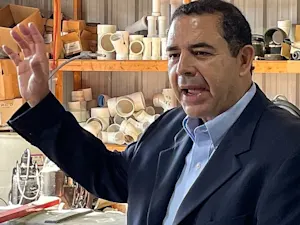
Trump: 'I'm Suing Myself' in DOJ Settlement Talks
President Donald Trump delivers his Joint address to Congress, Tuesday, March 4, 2025, in the House Chamber of the U.S. Capitol in Washington, D.C.. Official White House photo by Daniel Torok. Public domain.
President Donald Trump is reportedly demanding a staggering $230 million payout from the Department of Justice, seeking compensation for federal investigations into his 2016 campaign and the 2022 FBI search of his Mar-a-Lago estate. The claims, submitted through administrative channels while he was out of office in 2023 and 2024, have thrust the nation into uncharted legal and ethical territory, where a sitting president is effectively suing the very Justice Department he now oversees.
A Lawsuit Against Himself
The sheer oddity of the situation is underscored by Trump's own remarks. Speaking in the Oval Office alongside Attorney General Pam Bondi, FBI Director Kash Patel, and Deputy Attorney General Todd Blanche, Trump acknowledged the paradox. He described the predicament saying, "I have a lawsuit that was doing very well, and when I became president I said, 'I'm sort of suing myself.' I don't know, how do you settle the lawsuit," as reported by ABC News. He added that it "sort of looks bad" because he would be the one to approve any settlement.
The Claims at the Center
The $230 million figure reportedly stems from two separate administrative claims submitted by Trump's attorneys. The first, filed in late 2023, alleges violations of Trump's rights during the FBI and special counsel investigations into alleged Russian interference and possible connections to his 2016 campaign. The second, submitted in summer 2024, accuses the FBI of violating Trump's privacy during the 2022 Mar-a-Lago search for classified documents and claims malicious prosecution related to charges of mishandling sensitive records after he left office, as reported by ABC News.
The second claim specifically names former Attorney General Merrick Garland, former FBI Director Christopher Wray, and special counsel Jack Smith, accusing them of "harassment" intended to influence the 2020 election outcome, as reported by the New York Times. According to Law & Crime, the claim states that this "malicious prosecution" forced Trump to spend tens of millions defending himself and his reputation.
Who Decides the Settlement?
Justice Department rules say that any settlement involving payments to private parties must be approved by either the deputy or associate attorney general. In this case, Deputy Attorney General Todd Blanche and Associate Attorney General Stanley Woodward Jr. hold those roles. Both men have close ties to Trump's legal defense: Blanche served as Trump's lead criminal defense lawyer, and Woodward represented Walt Nauta, Trump's co-defendant in the classified documents case. Woodward has also represented other Trump allies, including FBI Director Kash Patel, in investigations related to Trump or the January 6 Capitol riot.
This creates a rare and unprecedented conflict of interest where Trump's former lawyers, now senior Justice Department officials, would decide whether to approve a massive payout to their former client, who is also the sitting president.
A Justice Department spokesperson told ABC News that all officials "follow the guidance of career ethics officials" in such matters, but declined to comment further on the status of the negotiations.
Legal and Ethical Questions
Legal experts have expressed concern over the ethical implications of the situation. Bennett L. Gershman, an ethics professor at Pace University, called the scenario "a travesty" and described the ethical conflict as "basic and fundamental," as reported by the New York Times. He noted the bizarre optics of having Justice Department officials who serve the president decide whether his claim should succeed.
The administrative claims process is typically a precursor to lawsuits, allowing for settlements without court involvement. However, the idea of a sitting president negotiating a settlement with his own Justice Department is without precedent in American history.
Trump's Public Statements
When asked about the $230 million demand, Trump acknowledged the unusual nature of the case saying, "And you know that decision would have to go across my desk, and it's awfully strange to make a decision where I'm paying myself," as reported by ABC News. He also noted that he's not focused on the money saying, "But I was damaged very greatly, and any money that I would get, I would give to charity.
Trump's legal team framed the claims as a fight against what they call "Democrat-led Witch Hunts," including the Russia investigation and the "weaponization" of the justice system by the Biden administration, as reported by The Hill.
The Political Backdrop
The claims come after Trump's reelection in 2024, which led to the dropping of federal cases against him due to Justice Department policy barring prosecution of a sitting president. The investigations, led by special counsels Robert Mueller and Jack Smith, had focused on Russian interference in the 2016 election and Trump's handling of classified documents.
The settlement talks highlight the complex entanglement of politics, law, and ethics as Trump navigates his second term with ongoing legal battles and political controversies.
What's Next?
The Justice Department has not publicly disclosed the status of the settlement talks. Given the high-profile nature of the claims and the unprecedented conflict of interest, any resolution will likely attract intense scrutiny.
For now, Trump's demand for $230 million from the very department he leads remains a striking example of the tangled web of power, law, and politics in Washington.
Whether the payout happens, and how it might reshape the boundaries of presidential authority and justice, remains to be seen.
References: Trump wants DOJ to pay him $230 million for previous investigations: Sources | Trump Said to Demand Justice Dept. Pay Him $230 Million for Past Cases | Trump lawyers talking with DOJ about settlement for past investigations | Trump cites Judge Cannon's dismantling of Jack Smith's authority to demand $100M in damages from DOJ over 'highly offensive' Mar-a-Lago search, reveals extent of legal bills






















